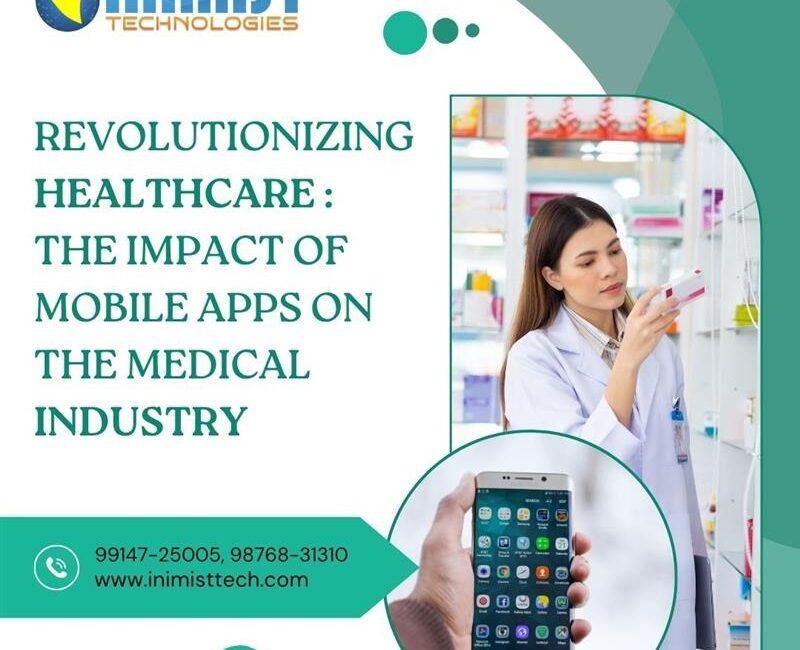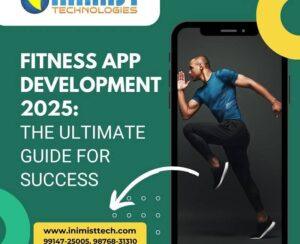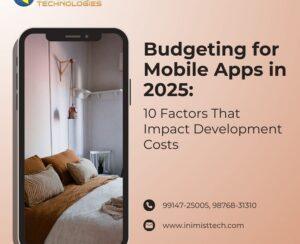
Inimist Tech | July 22, 2024
Revolutionizing Healthcare: The Impact of Mobile Apps on the Medical Industry
We live in a world where the Impact of Mobile Apps on the Medical Industry is revolutionary. Modern technology is no longer only about communication and entertainment. Mobile is playing a vital role in changing industries, such as healthcare. At the forefront of this revolution are mobile health applications (health apps for short), which provide patients, doctors, and medical professionals with tools that enable better efficiency, access, and outcomes. With the prevalence of smartphones, there is a digital revolution in healthcare over how patient care, diagnosis, and management will be based.

Smartphone apps have enabled patients to manage their health in a way never before possible. This includes everything from fitness tracking and medication management applications to more traditional health information and monitoring-based apps, which allow consumers to review their vital signs, schedule medication reminders, set personal health goals, and retrieve medical records, all in the palm of their hand. This greater reach also promotes a more proactive attitude about health and wellness.
Apps like MyFitnessPal, Apple Health, and Medisafe have millions of users actively taking control of their health habits. Others, such as Ada and WebMD, have a symptom checker that lets users know when they have to consult a medical professional to eliminate unnecessary trips to hospitals, and the time and resources it consumes.
Improving Communication Between Doctors and Patients
Mobile applications have emerged to narrow the communication gap between providers and patients. Real-time consultations on telemedicine platforms like Teladoc, Amwell and Practo can help doctors in diagnosing and advising patients. This has become particularly important during emergencies and pandemics,when in-person consultations present risk factors.
Furthermore, messaging apps also offer continued monitoring for caring for chronic conditions. Patients can also update their care team, ask questions, and receive responses without having a scheduled visit. This close contact ensures compliance with treatment plans and increases patient satisfaction.
Rationalization of Clinical Workflows
Healthcare applications are not just for patients — they are also revolutionizing the way hospitals work. Mobile apps help caregivers with scheduling, EHR access, diagnostics, and workflow automation. For example, apps such as Epocrates and UpToDate deliver immediate access to drug interactions, clinical guidelines, and evidence-based recommendations.
These tools reduce administrative burdens, minimize human errors, and allow healthcare workers to focus more on patient care rather than paperwork. Moreover, mobile dashboards and AI-integrated analytics support faster decision-making and personalized treatment plans.
Facilitator for Remote Telemonitoring and Long-term Disease Management
Woven-in mobile apps now enable monitoring of patients anywhere, anytime. In addition, diseases like diabetes, hypertension, and cardiovascular diseases can be monitored in a very effective manner through data from wearable devices when that data is integrated with mobile apps.
For example, continuous glucose monitors (CGMs), when combined with mobile platforms, can inform patients or doctors about dangerously high blood sugar levels. This ensures that the complication is avoided and allows the patients to modify their behavior using real-time feedback.
Motivating Health Research as well as Data Collection.
Mobile apps are useful weapons in clinical and public health research. Upon the consent of the users, apps can gather anonymized data on symptoms, drug efficacy, behavior, and demographics. Such an abundance of data can help to form the policies and recognize the disease outbreaks, as well as speed up the development of new treatments.
In the course of the COVID-19 pandemic, contact-tracing apps and symptom trackers have been of paramount importance in checking and identifying the patterns of the virus spread.
Challenges and Considerations
Despite the great advantages, there are problem areas to be resolved. Data privacy and cybersecurity continue to be the prominent issues since the health data is extremely private in nature. Those developing apps for mobile devices and the regulators should ensure that the apps meet standards such as HIPAA and GDPR. In addition to that, not all patients are tech-savvy and have access to smartphones and stable internet connections, thus pointing out the necessity of inclusive design and accessibility features.
The Future of Mobile Health
Mobile health apps have significant potential for growth as AI, machine learning, and IoT technologies evolve even further. Predictive analytics could anticipate medical problems before the symptoms emerge, and virtual assistants could help users go through the diagnostics and mental health care.
Mobile apps are likely to become the foundation of personalized medicine in the long-term future, sending personalized health experiences to individuals according to their profiles and real-time data.
Conclusion
There is no denying the fact that mobile apps are truly transforming the healthcare industry in terms of accessibility and communication, improved efficiency, as well as better patient outcomes. The journey is evident despite the existence of challenges: mobile technology is more than a tool and is a catalyst towards a more connected, enlightened, and empowered healthcare ecosystem.
The connection between healthcare and mobile innovation is creating a future in which wellness is not the end point but a journey of everyday life with technology guiding at each step.
Latest Posts
-
Hello World!
February 5, 2026 -
What Makes Modern Online Casinos So Popular
January 30, 2026 -

-

Fitness App Development in 2025: The Ultimate Guide for Success
November 5, 2025 -

